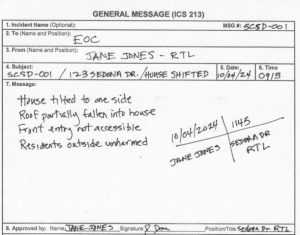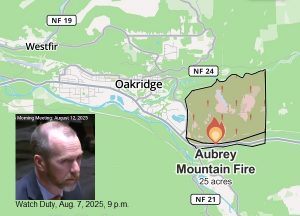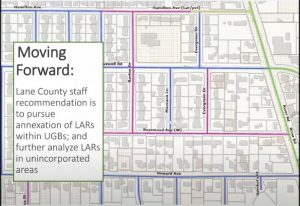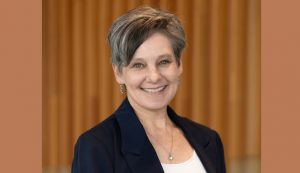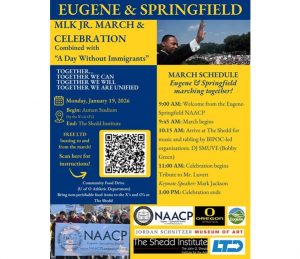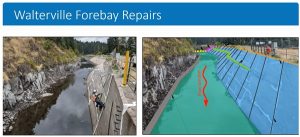Friends of Fall Creek Watershed to celebrate Earth Day with cleanup, fundraiser
14 min read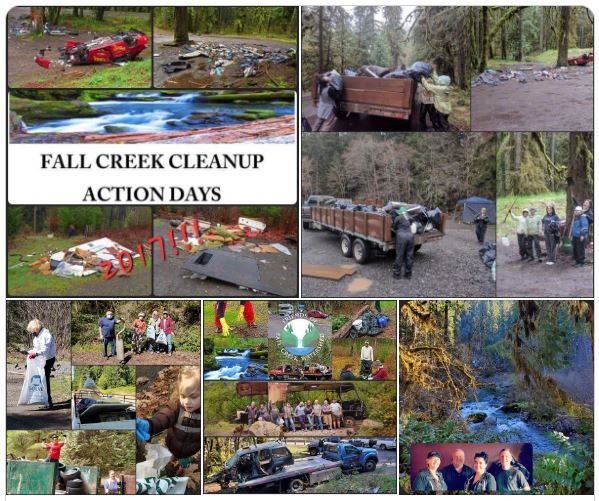
Jana Thrift: Hello, this is Jana and I’m here at KEPW LP 97.3 FM in Eugene and simulcasting at KEPW.org. And I am pleased to be with Jen Moss. She’s a founding member of the Friends of Fall Creek Watershed. And thank you for being at this, taking this interview with us.
[00:00:22] Jen Moss: Thank you for inviting me.
[00:00:24] Jana Thrift: Our pleasure. Our pleasure. So I guess I want to just dive in and ask you: What is Friends of Fall Creek Watershed? What do you guys do?
[00:00:33] Jen Moss: Well, starting in 2017, thanks to a social media post that I created, we clean the watershed. And we started along the Big Fall Creek Road out in Fall Creek ‘cause it’s one of my favorite areas to walk, and I had gone out on a spring walk and almost wrecked my car because I saw an upside-down red car with an explosion of garbage around it.
[00:01:01] And then just further up, I found things that I had seen there the previous fall. So I put up an event and people showed up. And some of those people said, ‘We should have a nonprofit and we should keep doing this.’
[00:01:15] And I said, ‘Okay.’ And so that’s what we do. We clean in Fall Creek. We clean in Winberry. We’ve actually expanded out into the Willamette National Forest in other areas. We also work with the BLM, so we work with the Middle Fork Ranger district and the BLM and clean areas that, Willamette watersheds that feed into the Middle Fork (Willamette) River.
[00:01:41] Jana Thrift: It’s so important. I mean, I think anybody that enjoys nature can attest to going out into the woods and seeing things that are out of place do not belong their downright mess sometimes. Yeah. And it’s sad. And I have to thank you. I just want to start by thanking you for your effort to do something good for our forests and our planet. It’s such important work and maybe you can tell me more about how others can get involved with your good work.
[00:02:10] Jen Moss: So we have a Facebook business page that we post our events on. We also have a Fall Creek Watershed Cleanup group that you can join on Facebook and an Instagram. And we have our website at FOFCW.org.
[00:02:27] You can sign up to get on the email list. The volunteer activities are usually on our Facebook page. The website doesn’t get updated as often. That’s something that we’re still working on. And so signing up with the email, you can also donate on there.
[00:02:42] And our board president, Steve, he has created an app that you can download. So far we have it for Android and the iPhones are next, and you can download that app and when you’re out there you can report sites or you can choose to clean up the site, take pictures, tell us about it, and we will pay for you. We will reimburse you for your dump fees.
[00:03:08] Jana Thrift: Wow, that is so cool. What a great way to inspire people to, to help out like that. That is really great. and it’s amazing an app that, he created an app to help with the project. Wow.
[00:03:22] Jen Moss: Yeah. If Steve hadn’t stepped up and said, ‘Hey, I know how to do the paperwork and I’m also good with computers and apps and all these things,’ I’m not sure how far I would have gotten. I was good at the networking, the calling people and finding out. But he’s really very good with the tech side and it’s amazing.
[00:03:42] I mean, even the Forest Service is interested in the app that he’s creating, because there are several place places out there that we clean repeatedly, but then every once in a while there’s new places.
[00:03:53] Data collection is going to be huge for helping to figure out how to curb some of the stuff that’s happening. Cause there’s places that we clean up three, four, or five times a year, same place over and over again, and it’s a huge impact in the area that needs to be addressed.
[00:04:13] Jana Thrift: Wow. Well that is really exciting, that there’s solutions happening that are able to hopefully make it to the Forest Service and more than just making an impact with the Fall Creek Forest over there.
[00:04:27] I love that forest and the mess that kind of is created over there sometimes is intense. And I can totally understand where you’re coming from with the idea that figuring out how to curb the problem.
[00:04:42] Jen Moss: Yeah, I mean, there have been moments where the Forest Service has thought about closing the dispersed areas out there because of how hard it is to maintain. And if we weren’t out there helping to maintain it, it might not be something, it might have been something that the Forest Service had been more likely to do because it is beyond their ability to do right now.
[00:05:05] It’s really easy to go and see things and say, oh, somebody should do something about it. And then call who you think is in authority and yell at them and tell them they need to go out there and do it.
[00:05:15] But it is totally different to find out, first of all, they don’t have the manpower or the financial ability to do it. And it’s something that you can do if you choose to do it, you can become a partner with them.
[00:05:30] And that’s one of the things we are, we have done, we are a partner with the Forest Service. We go out and clean these areas. We tell them where we’ve cleaned and they need that. They really need that. It, and being a volunteer is, Amazing. It gives back to you as much as you give to the area that you’re cleaning.
[00:05:49] And we have, we’ve, it’s not just Fall Creek and Winberry we’ve gone up towards Eagles Rest— there is a group out in Oakridge called 5 Rivers that we work with, that were inspired by us, that have formed their own group to clean in the areas around Oakridge. So we’ve helped clean out in Salmon Creek areas and there’s a lot to be done and we definitely need all the help we can get, but it has made a huge difference.
[00:06:16] As of this year we are at approximately, that we’ve measured, this doesn’t include all the other times that there’s been cleanups that haven’t been measured, 85 tons of garbage, 30 plus vehicles, and one 55-gallon drum of mysterious liquid that turned out to be methylated urine.
[00:06:35] Jana Thrift: Oh God. Wow. Wow. That is just amazing. And honestly, I think that one of the things you touched on really hits home for me that it is our forest and as much as we can look at hoping that the powers that be somehow should be responsible for making things happen. It’s our forest and taking that responsibility for ourselves and being the kind of community member that works to help make things better and not just try to figure out how somebody else could make it happen.
[00:07:08] It sounds like you guys are just proactive. I love it. And inspiring others. And it, we’ve interviewed a couple different people. There’s the guy Leaven No Trace (Raymond Furr), that does the bags alongside the roads, and he does a lot of cleanup around the—
[00:07:25] We’ve interviewed him before. He’s inspired us to talk with more community members and hope to get more support for all of this great work that different people are doing to care about that. I love the way he puts the sad faces on the bags and, you know, and the word ‘Care,’ that really says a lot to me, seeing the garbage left behind.
[00:07:49] I was raised in Oregon. I was born here and I was right? And I, maybe you like me, was taught as a very young child, you leave the place cleaner when you leave than when you show up. Take care of the forest. You do not throw your garbage in the forest.
[00:08:07] Jen Moss: My dad he worked for the BLM and he was a forester and the reason he chose the path that he did—He did fire forest firefighting, he was a forester, he worked with the BLM—the reason he chose that path was because he likes being in the woods and being in nature.
[00:08:22] We need that connection. And I grew up with that connection and it’s hard to see that not everybody has that same connection or understanding because there’s a reciprocity there that’s very important.
[00:08:36] Keeping those natural areas clean, it’s good for everyone. It’s good for us. It’s good for the stream— that water feeds us. We use that water system here. And if it’s coming downstream from upstream after being washed from high water, which we’ve seen, we’ve seen entire campsites get washed into the creek and head down the stream and don’t want to see that anymore.
[00:09:00] We want to be able to go back out and hang out in the woods and sit by the creek and contemplate life, not somebody’s dirty diapers.
[00:09:08] Jana Thrift: Right, right. Oh my goodness. Yes. So I want to invite you to share a little bit about your Earth Day cleanup that you’re having coming up.
[00:09:21] Jen Moss: Yep. So that will be the 21st and 22nd of this month. We meet at the old Fall Creek Tavern at 9 a.m. And then we caravan out from there. There’s no phone service, so, we have to have people meet up and register and sign in, and then we break up into groups and work as teams and we follow each other ’cause it is a large area that we cover. So we’re driving, we’re going up spur roads and it’s 9 a.m. to 2 p.m. both that Friday and Saturday.
[00:09:51] And it’s on Friday and Saturday because the dump is yet to be open on Sundays and there’s a lot we have to get rid of at the end of each day.
[00:09:59] Jana Thrift: And so that is something that you do regularly, it sounds like. How often do you, like if somebody were to miss it this month, they could catch it another time in the future. About how often do you do your cleanups?
[00:10:11] Jen Moss: We try to schedule them once a month. Sometimes it’s every other month. Gets a little harder in the summer because people are busy and we have harder time getting volunteers to come out. Sometimes we will post one that people can go out on their own.
[00:10:27] And like I said, you can go out on your own and clean up anytime. As long as you take before and after pictures and have your receipt from the dump, we will reimburse you. But our events, when we put them up, we usually put them up on Facebook. So that’s the best place to look for him. I also post about them on Instagram cause not everybody’s paying attention to Facebook so much anymore.
[00:10:49] And hopefully we’re going to start having a regularly updated calendar, but it is hard. There’s only four of us on the board. And it is hard for us sometimes to have, we wanted to have a regular schedule and haven’t been able to do that, but we’re working on it. So
[00:11:05] Jana Thrift: That sounds really good. And, there’s an email address they could always just email you and ask .
[00:11:10] Jen Moss: Yes. My personal email address for FOFCW is jen@fofcw.org. Or you can just write to info@FOFCW.org. And there is also a spot on the website, fofcw.org where you can enter your email address and let us know that you’re interested in participating.
[00:11:39] Jana Thrift: Perfect. Perfect. And the Facebook is just Friends of Fall Creek Watershed…?
[00:11:43] Jen Moss: The business page is Friends of Fall Creek Watershed. The name of the group is Fall Creek Watershed Cleanup. That’s just the group, (Okay) and then the business page is the Friends of Fall Creek Watershed business page for Facebook.
[00:12:02] Jana Thrift: Perfect. So one of the reasons we’re doing this interview is because Earth Day is coming up and they’re having a really beautiful Oregon Earth Day campaign that is trying to ramp up people’s involvement, different amazing organizations like yourself being involved with really celebrating the earth this year. And maybe you can tell us a little bit about how you are involved in that campaign.
[00:12:28] Jen Moss: I don’t remember where I heard about it first, but I do remember it was in 2019 and I had filled out the interest paperwork and there was some miscommunication, unfortunately, cause they were still putting this together.
[00:12:44] It was still a learning curve and it was pretty late in the game when I ended up talking to them and they said something about the needing the three business partners. And unfortunately, my brain came to a screeching halt because immediately I was like, ‘I need corporate business partners. That’s not going to happen.’
[00:13:00] So it seemed like it was just too late in the game. And I didn’t do it the first year. And then of course we had our COVID year. And last year I got involved and by then, I was starting to get the handle on fundraising, and it was really nice to cooperate with them and have them as a partner because it does allow us to have statewide recognition.
[00:13:27] It allows our business sponsors to have statewide recognition of the fact that they are supporting us. It allows us to get the word out for our events. It creates these situations where we I end up getting to speak to somebody about what’s going on and that, that kind of adds to.
[00:13:48] It does add to, there’s so many different facets that I’m already trying to do as a board member for Friends of Fall Creek that sometimes connecting with a radio station or the newspaper is not something that is available to me. But Earth Day Oregon has helped with that, with the publicity side.
[00:14:09] And also having them as our spring partner also helps remind me, ‘Oh yeah, it’s time for spring fundraising.’ I know we’re going to do the cleanup, but the fundraising part is very important because things like that 55-gallon drum of mystery liquid that I told you about, that cost us $400 to get rid of that.
[00:14:32] Jana Thrift: Whoa.
[00:14:32] Jen Moss: Just for that drum of liquid.
[00:14:35] Jana Thrift: Crazy. (Yeah.) Not to mention what it took to get it out of the woods.
[00:14:40] Jen Moss: Oh, yeah. We have some really awesome volunteers that are just absolute go-getters. Plus, our board members are active board members. It’s myself, Jessica (Portillo), Steve (Allaway), and Mac (Flood) and we all go out. Steve and Mac are amazing at creating resources. And then we have Tammy and Warren (Wilkerson) that have also been part of it from the very beginning.
[00:15:03] And I was not there for the removal of the drum, but I heard that it was not an easy task to get that. I mean, yeah, 55-gallon drum, that’s heavy.
[00:15:14] Jana Thrift: Yeah, it doesn’t sound like an easy task all the way around. Financially. Physically. It’s crazy. So I just want to really appreciate Earth Day itself because it really is a holiday of sorts that really is near and dear to my heart, and I’m sure being somebody who loves Nature and the forest.
[00:15:37] That’s what Earth Day is all about, and the idea of celebrating it through action is how the event began years ago, and not just a celebration of the earth itself, but a celebration that is meant to be about action and doing something to help the situation that we as human beings have created for the planet itself when it comes to keeping our water clean, as you had mentioned, keeping the forest healthy and not throwing our garbage everywhere, you know, so it seems like a no-brainer, but you know, you’ve got to say it out loud.
[00:16:18] Jen Moss: For some people, Earth Day is every day. When others, they need a reminder. And having something like this once a year to remind everybody to go outside and connect with nature and live in reciprocity because what it gives to us, we need to give back and that means, Cleaning things up and enjoying it and appreciating it and making sure that it, it’s healthy so that we’re healthy.
[00:16:42] Jana Thrift: Exactly. Said very well. Thank you. So I guess we’ll close it up with inviting you to talk about the May 9 fundraiser that you’re doing.
[00:16:53] Jen Moss: Oh, yes, May 9. It will be after Earth Day. It will be at Hilltop in Pleasant Hill. And we will be having some raffles there. We will be there from 5 p.m. to 9 p.m. and total sales. So you don’t need a flyer or anything like that, you just need to show up between 5 and 9 (p.m.) And their total sales of the evening, 10% of that they donate to us. They’re amazing people. We love being able to be there.
[00:17:20] Plank Town is the reason that Hilltop is out there. Plank Town is part of that, and Plank Town has been a supporter of ours from the very beginning. We had our first board, board meeting there and the owner came over and asked us what we were up to and then asked how he could support and help.
[00:17:36] And once Hilltop opened, because it is closer to the communities that we serve, which is out in the Lowell, Fall Creek, Unity, Oakridge, and obviously Pleasant Hill because they’re downstream. We’ve been able to go out at Hilltop and have board meetings there, and then we take over their back patio when we have our fundraisers and we just have a really good time and we have some great raffle prizes from local businesses and artisans and everybody just enjoys themselves immensely.
[00:18:06] So it’s definitely worth coming to. And you’re supporting the business and the nonprofit at the same time!
[00:18:12] Jana Thrift: Nice. Nice. That sounds great. And creating community within efforts that are meant to help the forest and help the planet is a really beautiful place to create community, in my opinion. And like making those connections and then being a part of those work parties, there’s a lot of different ways to create community and I think that that is one really positive way , to be a part of your community for sure.
[00:18:38] Jen Moss: I have some amazing friends that I wouldn’t have if I hadn’t started this whole thing and they hadn’t shown up when I put out the call. And we’ve all stayed friends, and it has created a community.
[00:18:50] It takes community to do these things, to take care of the spaces that we live in, but then you also find out that you can make amazing friends with your neighbors and your community, and it’s a lasting connection that’s important.
[00:19:07] Jana Thrift: So true. So true. Well, with that, we’re going to thank you for interviewing with us. I’m sincerely thankful for all you do, Jen Moss. Thank you for that. And thank you for sharing all this with our listeners.
[00:19:21] Jen Moss: Thank you for the opportunity. I really appreciate it.
[00:19:24] Jana Thrift: All right, you have a beautiful day.
[00:19:25] Jen Moss: You too as well.
[00:19:27] Jana Thrift: Thank you. This has been KEPW LP 97.3 FM in Eugene, and simulcasting at KEPW.org. I’m Jana and you are just listening to Jen Moss with the Friends of Fall Creek Watershed. Thank you for listening.

